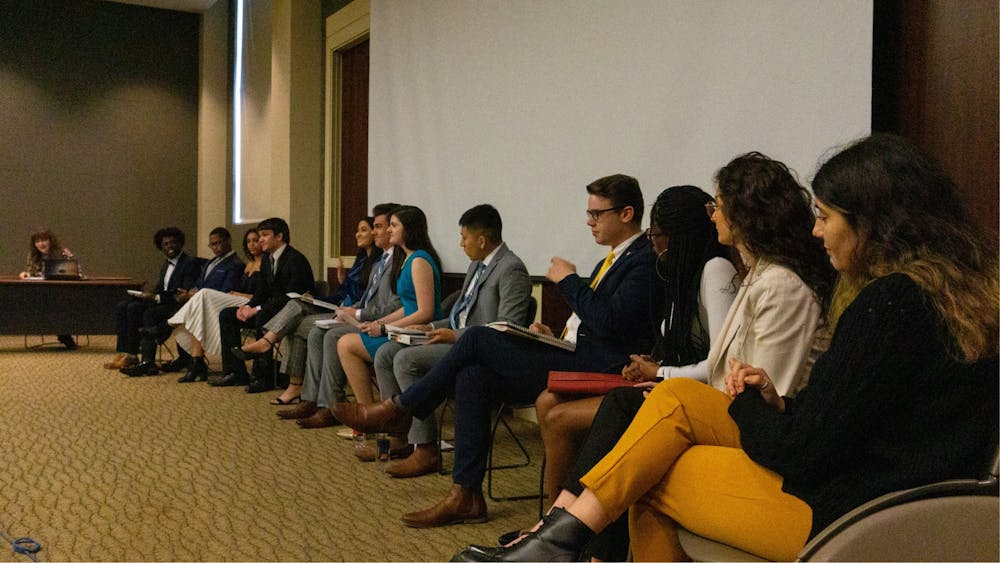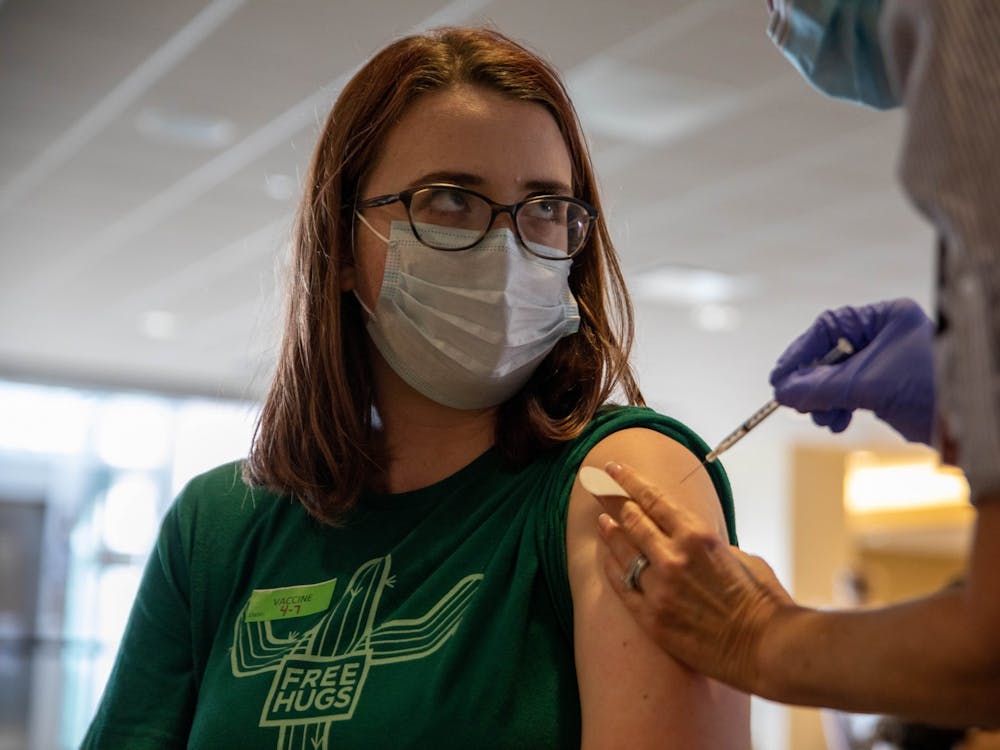Editor's Note: A previous version of the article stated Connor Sanburn voted against the "Zero Tolerance Policy" legislation. While Sanburn did not support the legislation, he held no voting powers in Student Government Association. The article has been updated to reflect this change.
Three slates aiming to lead the Ball State’s Student Government Association (SGA) senate next year met for the first time at the Art and Journalism Building for the first debate of the 2020 SGA election.
The Alliance, Aureum and Bold slates provided the audience with an introduction to their goals, along with answers to specific questions from a moderator.
The Benson/Borna incident:
One of the more prominent issues addressed by the debaters was the recent incident involving Ball State marketing professor Shaheen Borna and student Sultan “Mufasa” Benson, which ended with university police being called to the classroom.
RELATED: Ball State student, university discuss incident caught on video
“I know [Benson] on a personal level, and he is very outgoing, he’s very driven and resilient, and the way that I’ve seen him affected on a fundamental level, it affected me,” said Malachi Jones, vice presidential candidate of Alliance. “Also being a young African-American male … I just wanted to know, how will I feel if that happens to me.”
Jones said seeing students speaking up on behalf of Benson was his “proudest moment as a Cardinal”, and that change was needed on campus.
RELATED: Ball State community reacts to campus controversy
Meanwhile, Aureum presidential candidate Miryam Bevelle said while Borna was wrong for calling the police, her slate would be staying out of the issue in their platform points.
“We did not add a platform point [on the incident] to our platform currently, because we didn’t want anything specific towards this point, because we didn’t want to be opportunistic off of this incident that happened recently,” Bevelle said. “We didn’t want to take the narrative away from people that have been affected by this like Mufasa.”
Bevelle added that the Aureum slate would be focusing its efforts on issues that would affect the larger student body beyond just African-American students, though they would look into faculty bias training once elected.
RELATED: Ball State community discusses issues faced in a predominantly white university
Jordyn Blythe, Bold’s vice presidential candidate, later responded that her slate would be looking into more specific goals in response to the incident, including cultural dialogue courses and mandatory faculty diversity training.
“[There’s] nothing opportunistic about these points, because every black person on this campus, I assure you, has experienced a microaggression on some sort of level,” Blythe said. “Now we have a platform to do something about it, so we will.”
Zero Tolerance Policy:
The debate also tackled last semester’s “Zero Tolerance Policy” resolution, which penalizes Greek Life organizations more harshly for cases of sexual assault and hazing.
RELATED: SGA passes Greek Life ‘Zero-Tolerance’ resolution
Connor Sanburn, Bold's presidential candidate, acknowledged his own bias on the issue as a member of a Greek Life organization, and that he did not support the resolution when it was introduced.
“The coversation was made to be — either you support sexual assault survivors, or you support Greek Life — and that is not at all how this conversation should have been,” Sanburn said. “There was a lot of miscommunication among people who are not related to the bill.”
The Bold slate was the most divided of the three on the issue, with Sanburn and Blythe against the issue and secretary candidate Gina Esposito supporting the bill.
Sanburn said future legislation that affects one particular group should be reviewed more objectively, beyond allegiances to both Greek Life and SGA.
James Schwer, Alliance treasurer candidate, was similarly critical of the legislation, saying he did not think it was “proper or right in any way.”
“I also think that the fact that a lot of the organizations affected by it didn’t know about the legislation until right up until it came out, that’s sort of indicative of student government failing as representatives of students,” Schwer said.
Alliance presidential candidate Aric Fulton also said he thought the legislation was not representative of the students’ opinions on the topic.
“I’ve had several residents and several of my coworkers constantly [being] furious about the bill,” Fulton said.
The Aureum slate drew contrast as the only slate who supported the resolution, with three senators voting for the legislation. However, Bevelle was critical of some aspects of the resolution.
“We do not support the lack of a blanket policy within this legislation,” she said. “We would support a version of this legislation that would subject every organization on campus to this higher standard.”
Sexual assaults on campus:
Finally, the slates addressed the issue of sexual assaults on campus.
“We wish to work with the Counseling Center to promote resources for sexual assault that already exists, while finding additional useful resources to promote to students, such as the Aspire app,” said Dylan Lewandowski, Aureum vice presidential candidate.
Lewandowski also said his slate wants to implement a sexual assault training module for freshmen, much like the drug and alcohol awareness module that is currently available.
The Bold slate took a more open approach to the problem, saying they would work with the Counseling Center to expand its services.
“It was important that we kept this point open and flexible because we understand that administration does not work on our time,” Sanburn said. “We’ve got to work on their time, and we're not sure what the big issue is going to be on campus this fall.”
Finally, members of the Alliance slate said they would work with expanding the Office of Victim Services and victim peer advocates role in dealing with sexual assault, and that they would work with the Counseling Center like the other slates.
“I’d say the second-biggest thing, which I think the other slates have said, is counseling services,” said Avery Pollard, Alliance treasurer candidate. “As a survivor of sexual assault myself, I can say the two biggest things are prevention, and then after something has happened, definitely getting the person the help they need.”
The debate ended with each slate making their pitch for their election. The next debate between the presidential and vice presidential candidates of each slate, will take place 7 p.m. Feb. 10 in the Art and Journalism Building room 175.
Contact John Lynch with comments at jplynch@bsu.edu or on Twitter @WritesLynch.





